

Share
14th June 2017
05:54pm BST

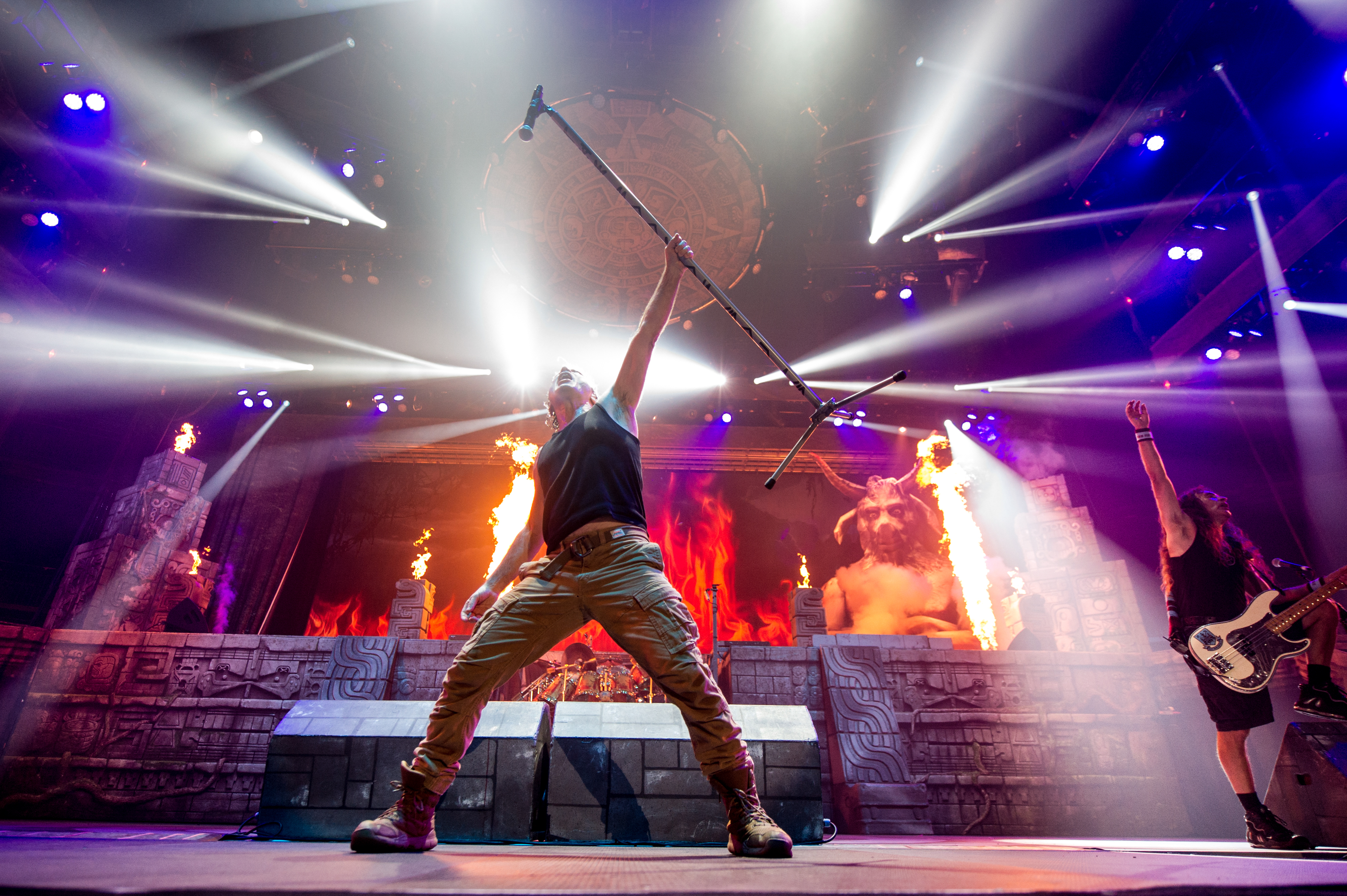 Most bands would feel lucky to achieve even a tenth of what Iron Maiden have. It's not just the 16 studio albums and 22 headline tours, nor the staggering 42 years they've been together, or even the fact they've got their own beer, Trooper: "a deep golden ale with a subtle hint of lemon."
Iron Maiden are a British institution, one of the most influential heavy metal bands of all time, and despite a near-total absence of radio play and limited press coverage, they can still sell out arenas and top the album charts at home and abroad.
The reason for this is plain, understood from the moment you set foot anywhere near a Maiden gig: they have the most loyal and dedicated fans of any band working today.
From speaking to people on either side of the barrier - those in Maiden's production and management team to the people out in the arenas enjoying the show - it's clear that the relationship between the band and their fans is deep and constantly maintained by both parties. Iron Maiden sustain their fans, and the fans sustain Iron Maiden.
Most bands would feel lucky to achieve even a tenth of what Iron Maiden have. It's not just the 16 studio albums and 22 headline tours, nor the staggering 42 years they've been together, or even the fact they've got their own beer, Trooper: "a deep golden ale with a subtle hint of lemon."
Iron Maiden are a British institution, one of the most influential heavy metal bands of all time, and despite a near-total absence of radio play and limited press coverage, they can still sell out arenas and top the album charts at home and abroad.
The reason for this is plain, understood from the moment you set foot anywhere near a Maiden gig: they have the most loyal and dedicated fans of any band working today.
From speaking to people on either side of the barrier - those in Maiden's production and management team to the people out in the arenas enjoying the show - it's clear that the relationship between the band and their fans is deep and constantly maintained by both parties. Iron Maiden sustain their fans, and the fans sustain Iron Maiden.
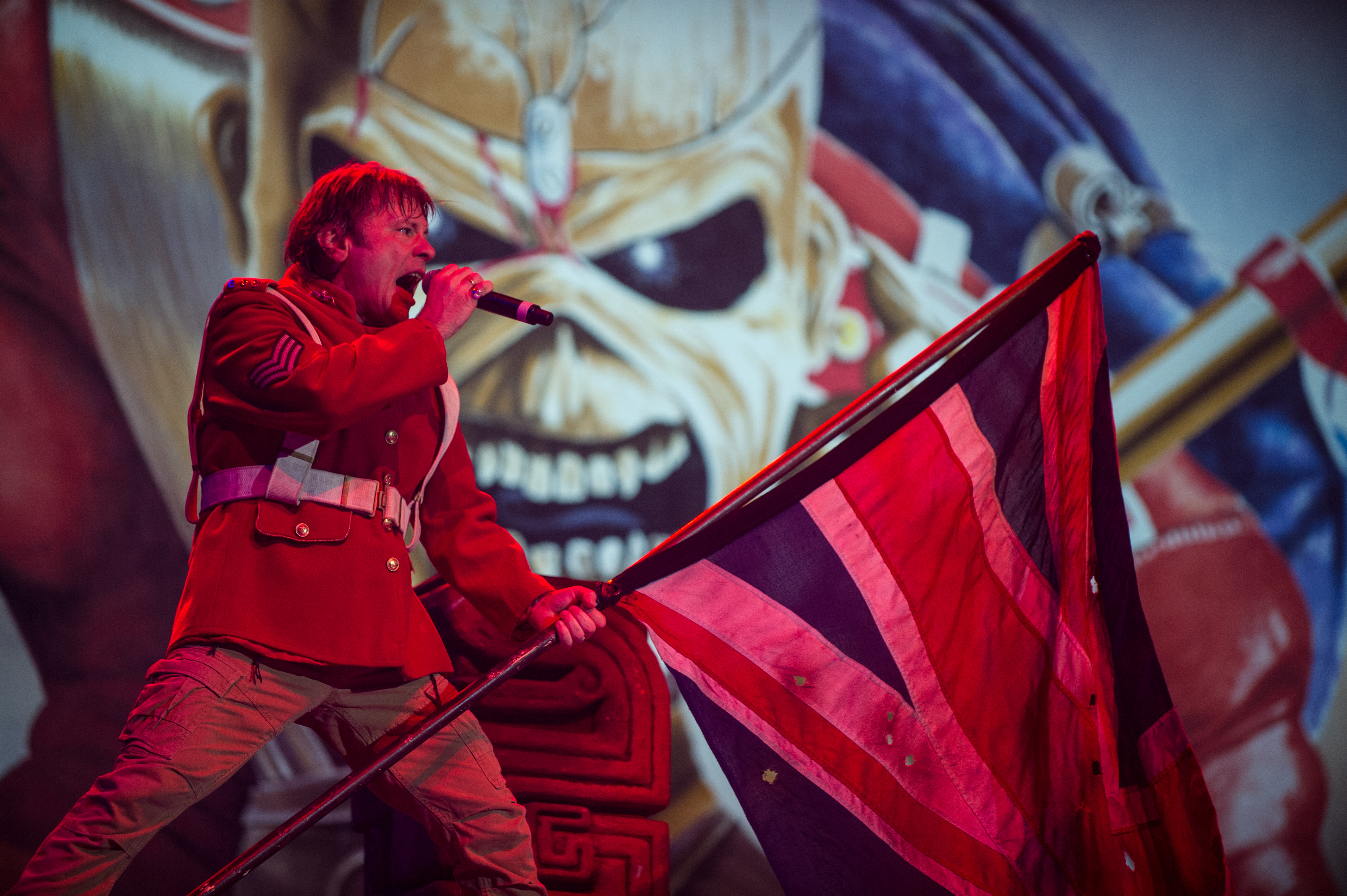 "I think it's like that with most bands, but perhaps a lot of bands lose sight of their fans," says Llexi Leon, Interactive Creative Director at Phantom Music Management, founded by the band's long-time manager Rod Smallwood.
"I think it's like that with most bands, but perhaps a lot of bands lose sight of their fans," says Llexi Leon, Interactive Creative Director at Phantom Music Management, founded by the band's long-time manager Rod Smallwood.
"Imagine that Iron Maiden had a contract with the fans. It would always say: 'We will make our best effort to act in the interest of the fans'. That’s what they're trying to do. There are very few bands that operate in that way. "A lot of bands make strange decisions that aren't for the fans. Naming no names, but there are bands that operate in the best interest of their bank balance."Names were not named, but consider that fellow metal monoliths Metallica were charging nearly £100 for a standing ticket to their 2017 shows. Iron Maiden have gone further than offering reasonably priced tickets for their shows; they've been spearheading a campaign to tackle ticket touts, who exploit fans by buying up huge chunks of tickets and sell them on at exorbitant prices. As is pointed out to me, most bands (or at least most bands' management) aren't too fussed by this, as it makes their tours sell out quicker. For Iron Maiden, that might look good on the poster, but it's bad business. "That money is not feeding back into the economy, other than for these exploitative bastards," says Dave Shack, Managing Director of Phantom.
"It doesn't go to the band or the music community or the venue - it goes to these unscrupulous buggers. "If you've got a fan who should be paying face value for a ticket and they're paying three or four times that, that has got an effect on the whole gig economy, where a kid's going 'Well, I've paid so much for a ticket, I can't possibly afford the souvenir t-shirt or a pint at the gig.' "The way we'd like it to be is those kids are spending the face value on the ticket and then being able to go and see two or three bands in the pub the next couple of nights, instead of having to stay in because some unscrupulous ticket company has just rinsed them."
 To tackle this, Maiden have been employing new paperless ticketing technology. No tickets are sent out or collected from the box office. Instead, fans arrive with the credit card they used to buy the tickets, the card is swiped, and if all the details check out, the fans are granted entry to the venue.
According to the band, the new system has been a roaring success, reporting that they've decreased listings on secondary ticket sites by over 95%. The custodial responsibility that Maiden feel doesn't stop at the door, however. It extends way beyond the purchase of a ticket.
"We have a very, very active global fan club, and we guarantee that anyone in our fan club can get tickets for our show," Dave says.
To tackle this, Maiden have been employing new paperless ticketing technology. No tickets are sent out or collected from the box office. Instead, fans arrive with the credit card they used to buy the tickets, the card is swiped, and if all the details check out, the fans are granted entry to the venue.
According to the band, the new system has been a roaring success, reporting that they've decreased listings on secondary ticket sites by over 95%. The custodial responsibility that Maiden feel doesn't stop at the door, however. It extends way beyond the purchase of a ticket.
"We have a very, very active global fan club, and we guarantee that anyone in our fan club can get tickets for our show," Dave says.
"Every night we do 'First to the Barrier' for our fans. There’s no cost - we name 100 people a night that are drawn out of the fan club that’ve bought tickets for the gig, and they can be the first people in the venue. "We know that we have a travelling fan base who will travel to 10 or 20 shows. What we've been doing is setting up meets where the fan club can get together over a Trooper, give them a safe environment to meet like-minded people outside the venue, then they see the show."Iron Maiden evidently care deeply about their fans, even to the point of giving themselves logistical and financial headaches. Maiden are famous for their elaborate, theatrical live productions; a standard set-up involves huge, raised platforms, immersive set designs and a larger-than-life-sized walking Eddie (the band's iconic mascot). It's not as simple as turning up and plugging in a few amplifiers.
 Here in the UK we have the infrastructure that can make shows like Maiden's happen, but Maiden have fans around the planet, and some of the countries they've visited recently like India, China and El Salvador are not used to big touring rock bands coming their way.
Most bands perhaps wouldn't bother bringing their expensive and complex rigs to the far corners of the earth.
"Maiden are like, ‘Fuck that. If we're playing China, we're playing China'," says Llexi.
"We play on a 50ft-wide stage and we bring the entire Mayan temple. We bring Eddie, we bring our own mixing desks - we facilitate all that.
"If it's the first time they're playing China, [the fans] need to get the same experience that we gave to our longtime fans in Tokyo or LA or wherever."
Dave concurs. "We strive for the highest quality of product. You're not coming away from a show going, 'Well that t-shirt's fallen apart' or 'this product is substandard'," he says.
"We stand for more than that. We try and be the very best that we can possibly be with everything that we do, end of story. Just in the same way the band can't be any better than they are on stage."
And it's true - my t-shirt from 2006 has far from fallen apart. "Fucking great," Dave says. "I'm proud of that fact, and that's how it should be."
Here in the UK we have the infrastructure that can make shows like Maiden's happen, but Maiden have fans around the planet, and some of the countries they've visited recently like India, China and El Salvador are not used to big touring rock bands coming their way.
Most bands perhaps wouldn't bother bringing their expensive and complex rigs to the far corners of the earth.
"Maiden are like, ‘Fuck that. If we're playing China, we're playing China'," says Llexi.
"We play on a 50ft-wide stage and we bring the entire Mayan temple. We bring Eddie, we bring our own mixing desks - we facilitate all that.
"If it's the first time they're playing China, [the fans] need to get the same experience that we gave to our longtime fans in Tokyo or LA or wherever."
Dave concurs. "We strive for the highest quality of product. You're not coming away from a show going, 'Well that t-shirt's fallen apart' or 'this product is substandard'," he says.
"We stand for more than that. We try and be the very best that we can possibly be with everything that we do, end of story. Just in the same way the band can't be any better than they are on stage."
And it's true - my t-shirt from 2006 has far from fallen apart. "Fucking great," Dave says. "I'm proud of that fact, and that's how it should be."
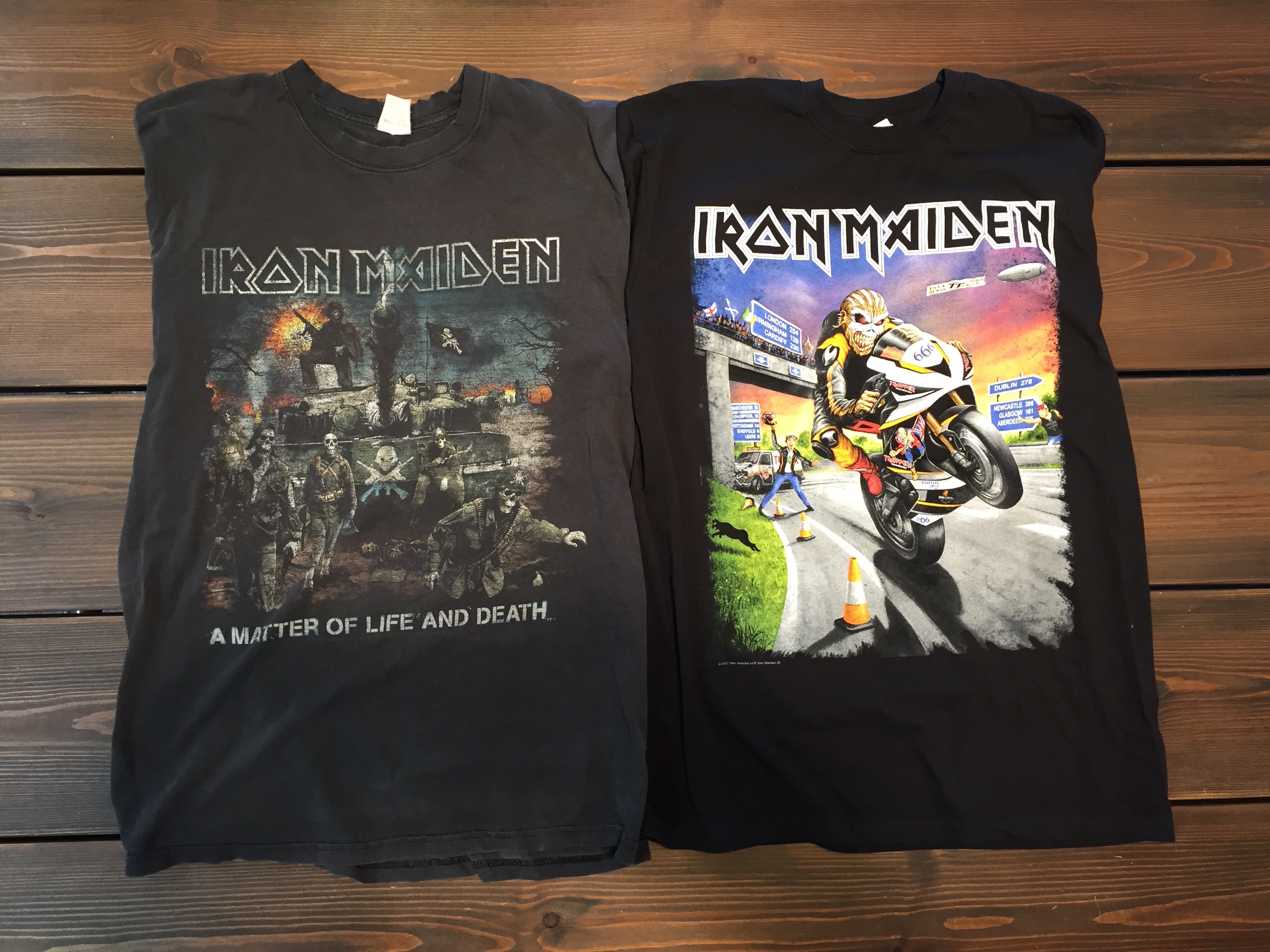
My 10-year-old shirt next to a brand new Maiden tee
The relationship between a band and its fans is a working one. Without fans, a band has no platform; they stand on the shoulders of those who support them. Iron Maiden know this better than most and go many extra miles for their fans, but it never feels like the band are placating them or just trying to keep the fans happy. It feels like mutual respect. "Maiden treat their fans well," says Dan Feeny. "You can tell they still love what they do, and they do it for the fans - there’s too much passion for that not to be the case." Dan is 26-years old, from Rochester, New York, and has seen Iron Maiden over 70 times in the 13 years he's followed them. You could call him a bit of a superfan. I met Dan through the Iron Maiden community on Reddit - /r/ironmaiden - a very active and passionate fan forum. Spaces like these are important to fan culture on the internet, be they forums, Twitter, Facebook groups - anywhere that fans can discuss their interests. As anyone with a passing knowledge of fan culture knows, it can sometimes turn into a bit of a dick-measuring contest, with fans gloating over how much more of a fan they are than others, based on fairly arbitrary standards. For Dan, the Maiden fan community are an exception. "The biggest thing for me is, there’s no sense of superiority with most people, based on how many gigs they’ve seen or how big their [record] collection is," he says. "It doesn’t matter if you’ve seen the band three times or three hundred times - if you love the band, we’re all equal. "I don’t consider myself a bigger fan than anyone else just because I’ve seen them so many times, and luckily many Maiden fans have the same attitude."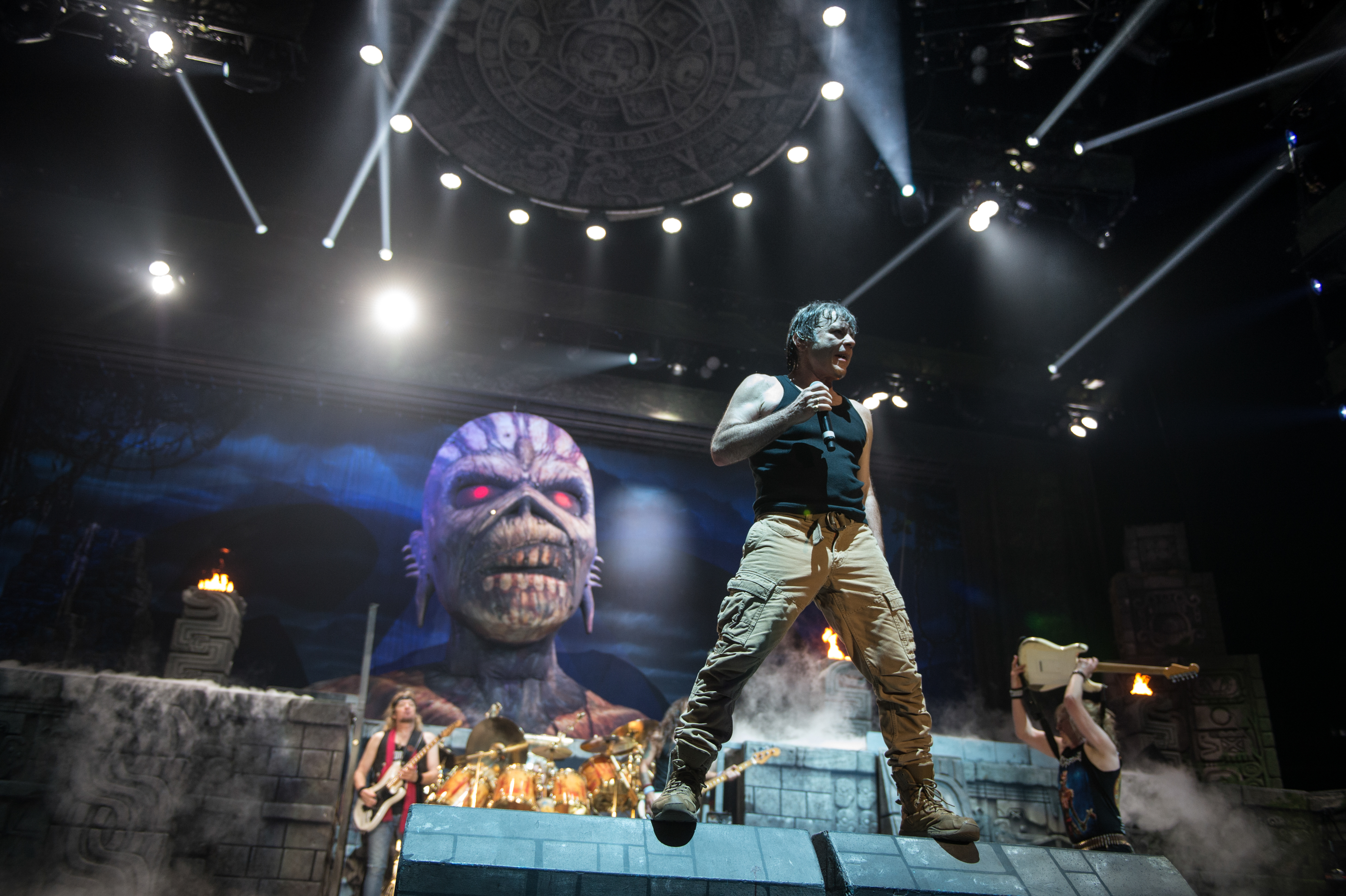 Backstage in Nottingham I meet another superfan, a man from Tokyo who told me to call him Nick.
He had flown over especially to see the show, having been the top bidder on charity auction, winning the chance to watch the show from the mixing desk. This was his first time in the UK.
"I"m very nervous," Nick said. "But England, UK is very beautiful country. I love UK! Maiden fans in Japan think UK fans is God, because: Maiden England."
Nick had just met Steve Harris, bassist and founder of Iron Maiden - "He's my hero. He's my idol." Steve had been doing the rounds, shaking hands, taking photos and exchanging pleasantries. We said hello, he seemed perfectly pleasant and happy to pose for pictures, but after 15 minutes or so he was whisked away and that was that.
Then, as I went out to catch some of opening act Shinedown, I saw Steve in the corridor chatting with another group of fans. And as I returned, having watched Shinedown, I saw Steve again, still in the corridor, still chatting with the fans. He was due on stage shortly, yet he was still there in the corridor, chatting away merrily.
Backstage in Nottingham I meet another superfan, a man from Tokyo who told me to call him Nick.
He had flown over especially to see the show, having been the top bidder on charity auction, winning the chance to watch the show from the mixing desk. This was his first time in the UK.
"I"m very nervous," Nick said. "But England, UK is very beautiful country. I love UK! Maiden fans in Japan think UK fans is God, because: Maiden England."
Nick had just met Steve Harris, bassist and founder of Iron Maiden - "He's my hero. He's my idol." Steve had been doing the rounds, shaking hands, taking photos and exchanging pleasantries. We said hello, he seemed perfectly pleasant and happy to pose for pictures, but after 15 minutes or so he was whisked away and that was that.
Then, as I went out to catch some of opening act Shinedown, I saw Steve in the corridor chatting with another group of fans. And as I returned, having watched Shinedown, I saw Steve again, still in the corridor, still chatting with the fans. He was due on stage shortly, yet he was still there in the corridor, chatting away merrily.
 Iron Maiden's dedication to its fans is beyond contestation, but it's not always reciprocated like-for-like. If you were a 17-year old Maiden fan in 1982, when The Number of the Beast was first released, you'd be about 52 now. People get older. Priorities change.
Out in the crowd I meet a couple, Dave and Anne. When I ask Dave what he's looking forward to the most about this evening, he simply says: "Going home." Dave doesn't really do big gigs these days.
"We used to go to a lot of concerts when we were younger, and I can't be doing with all the people, really. I used to be fine until people happened."
There are, noticeably, quite a few people in the Motorpoint Arena, so why has Dave made it out for Maiden?
"I've not seen them in 20 years," he says. "We were gonna go and see them at Donington, but Donington turned into ankle-deep shit pit in about 30 minutes on the Friday, so we decided, ‘Y’know what? We can’t be arsed with this’. So this really is the final hurrah."
"It was really disappointing, because I love seeing Iron Maiden," Anne adds. "As soon as I heard they were playing I said, 'Well, we've gotta go."
For Dave and Anne, Maiden represent something that few other bands can, something more than a finely-tuned heavy metal show or a theatrical night out. They are themselves. They are authentic. They are Iron Maiden.
"They're British and they understand a British crowd," Dave says. "Shinedown can perform, they just showed that, they can really rock it out, but they're just so up themselves that they wanna fuck around all the time."
"You don't get any of that with Iron Maiden," agrees Anne.
Iron Maiden's dedication to its fans is beyond contestation, but it's not always reciprocated like-for-like. If you were a 17-year old Maiden fan in 1982, when The Number of the Beast was first released, you'd be about 52 now. People get older. Priorities change.
Out in the crowd I meet a couple, Dave and Anne. When I ask Dave what he's looking forward to the most about this evening, he simply says: "Going home." Dave doesn't really do big gigs these days.
"We used to go to a lot of concerts when we were younger, and I can't be doing with all the people, really. I used to be fine until people happened."
There are, noticeably, quite a few people in the Motorpoint Arena, so why has Dave made it out for Maiden?
"I've not seen them in 20 years," he says. "We were gonna go and see them at Donington, but Donington turned into ankle-deep shit pit in about 30 minutes on the Friday, so we decided, ‘Y’know what? We can’t be arsed with this’. So this really is the final hurrah."
"It was really disappointing, because I love seeing Iron Maiden," Anne adds. "As soon as I heard they were playing I said, 'Well, we've gotta go."
For Dave and Anne, Maiden represent something that few other bands can, something more than a finely-tuned heavy metal show or a theatrical night out. They are themselves. They are authentic. They are Iron Maiden.
"They're British and they understand a British crowd," Dave says. "Shinedown can perform, they just showed that, they can really rock it out, but they're just so up themselves that they wanna fuck around all the time."
"You don't get any of that with Iron Maiden," agrees Anne.
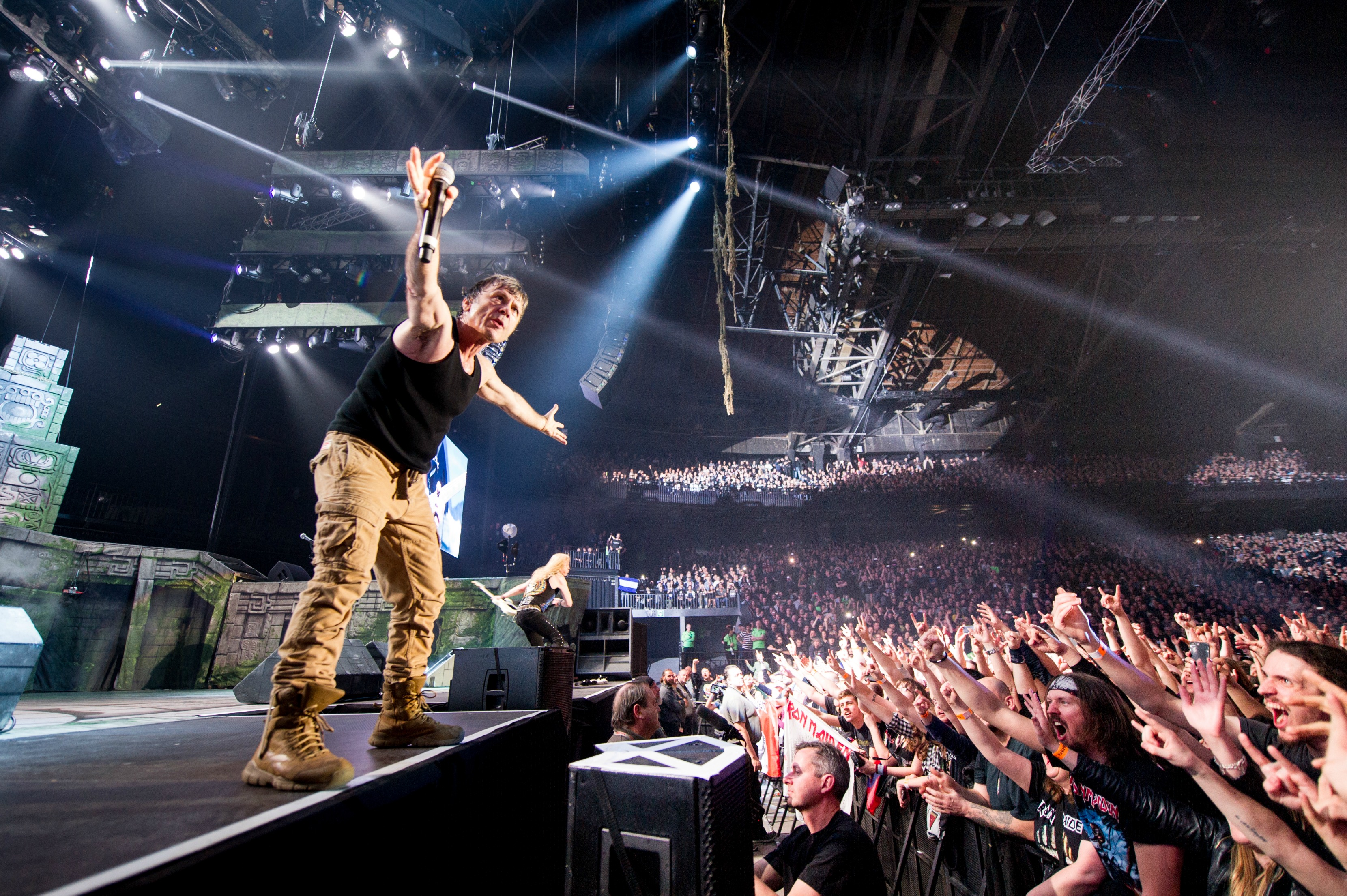 "You always know what you're getting from an Iron Maiden show," another fan tells me in the queue for the bar. "You know you're going to have a brilliant show."
"You always know what you're getting from an Iron Maiden show," another fan tells me in the queue for the bar. "You know you're going to have a brilliant show."
"Great stage displays. A lot of thought goes into what Maiden do, even to the point of Ed Force One [Maiden's private plane, piloted by Bruce Dickinson] landing at Download last year. The airport's right next to the campsite so you could watch them land. "There's not a single artist in the entire world who can do that. Who can sell out tour after tour, year after year, and have their own fucking plane? Metallica might think they're bigger, but they haven't got that. "£100 a ticket for Metallica? Fuck that shit."For superfan Dan, the live experience is certainly part of what has brought him back to Iron Maiden over 70 times: "It’s a very high-energy live show, which is also extremely tight musically. It’s rare that a band can cover both ends of that spectrum so well. "They’re also not a band afraid of doing what they want to do, which helps keep the show fresh from tour to tour. "You know if they’re doing a history tour, you’ll get some extremely deep album cuts that haven’t been played in 20+ years, while on tours promoting a new album, you know you’ll be getting a very healthy dose of new songs played live." But for Dan and many other fans, there's more to Maiden than watching them live or blasting out the hits at home. It's about the community. "I’ve got friends in about 40 different countries thanks to Maiden," he says. "Whenever the band is on tour, we all help each other out with rides between cities, people let each other stay with them. "Last year when the band was in Toronto I had nine people all staying at my house, and it’s nice because a lot of times, you know people are able to return the favour when you’re in their neck of the woods. "Maiden fans are really like a big family. Maiden fans take care of each other through thick and thin, and once you become a part of this community, you’re in it for life." Thanks to Phantom Music Management, Wilful Publicity and /r/ironmaiden
Explore more on these topics: